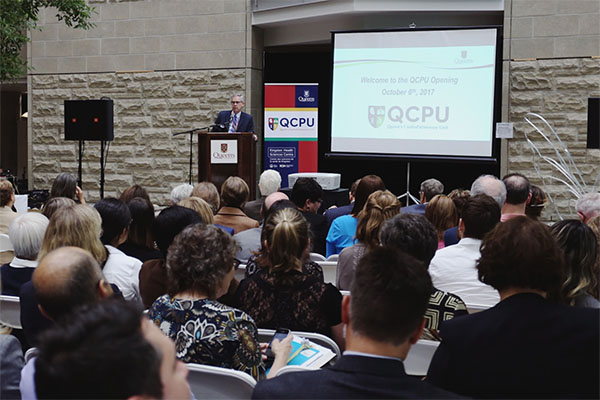World-class cardiopulmonary research facility opens
October 6, 2017
Share
The Canada Foundation for Innovation and the Ontario Ministry of Research, Innovation and Science have jointly awarded $7.7 million in funding to establish a new, state-of-the art facility, the Queen’s CardioPulmonary Unit (QCPU) which opened its doors to the public for the first time on Friday, Oct. 6.

The new QCPU, housed within the Queen’s Biosciences Complex, allows the team to conduct world-class, transformative heart, lung, blood and vascular research to identify novel therapeutic targets and evaluate them in preclinical studies. The QCPU team will then translate these preclinical discoveries to humans through investigator-initiated clinical trials located in Kingston, Ottawa, Edmonton, Chicago, Minneapolis, Salt Lake City, and Sao Paulo, Brazil.
QCPU is the brainchild of Stephen L. Archer, Head of Medicine at Queen’s University and recipient of a prestigious Tier 1 Canada Research Chair in Mitochondrial Dynamics and Translational Medicine. QCPU is a catalyst that accelerates research and discovery.
“Unique aspects of QCPU include the assembly of potent research teams and the provision of state-of-the-art tools that exist in very few centres in Canada or indeed globally,” says Dr. Archer.
QCPU is integrated with Kingston Health Sciences Centre, designated as a hospital satellite, and offers a state-of-the-art cardiac ultrasound facility and cardiopulmonary testing facility to explore why patients with heart and lung diseases are short of breath. In addition, there are exam rooms for patients in clinical trials.
On the basic science side, QCPU has a two-photon confocal intra vital microscope, allowing scientists to peer inside organs, blood vessels and cells. There is also a micro-PET-SPECT-CT to study preclinical models of human disease, says Dr. Archer. Finally, QCPU has advanced facilities for cell culture, protein chemistry and a NexGen sequencer to assess the role of the human genome and epigenome in disease.
“QCPU also supports patients who are participating in clinical trials, and connects them with scientists who study disease mechanisms and clinician investigators who are inventing new more effective treatments. The air that investigators and students breathe in QCPU is perfumed with creativity and a sense of discovery that focuses them on the identification of cures for heart, lung, blood, and vascular diseases. They are inspired and informed by the patients who pass through our center,” says Dr. Archer.
The network will also patent and commercialize its discoveries through partnerships with PARTEQ Innovations, Queen’s technology transfer group.
"QCPU will introduce a novel structure in which scientists who pursue the fundamental secrets of cells align with clinician investigators. This holds great promise for drug development and new therapies. Based on a model of research that is at its heart translational in nature, development will be directed by this unique interaction at the interstices of biomedical research,” says John Fisher, interim Vice-Principal (Research). “Due to the comprehensive ‘bench to bedside’ scope of QCPU research, its investigators have profound control over the discovery-therapy pipeline, so that novel approaches and targets identified in preclinical studies can be moved into multicenter, investigator-initiated trials throughout North and South America.”